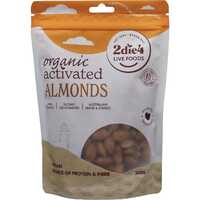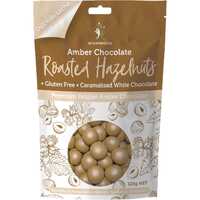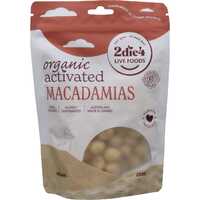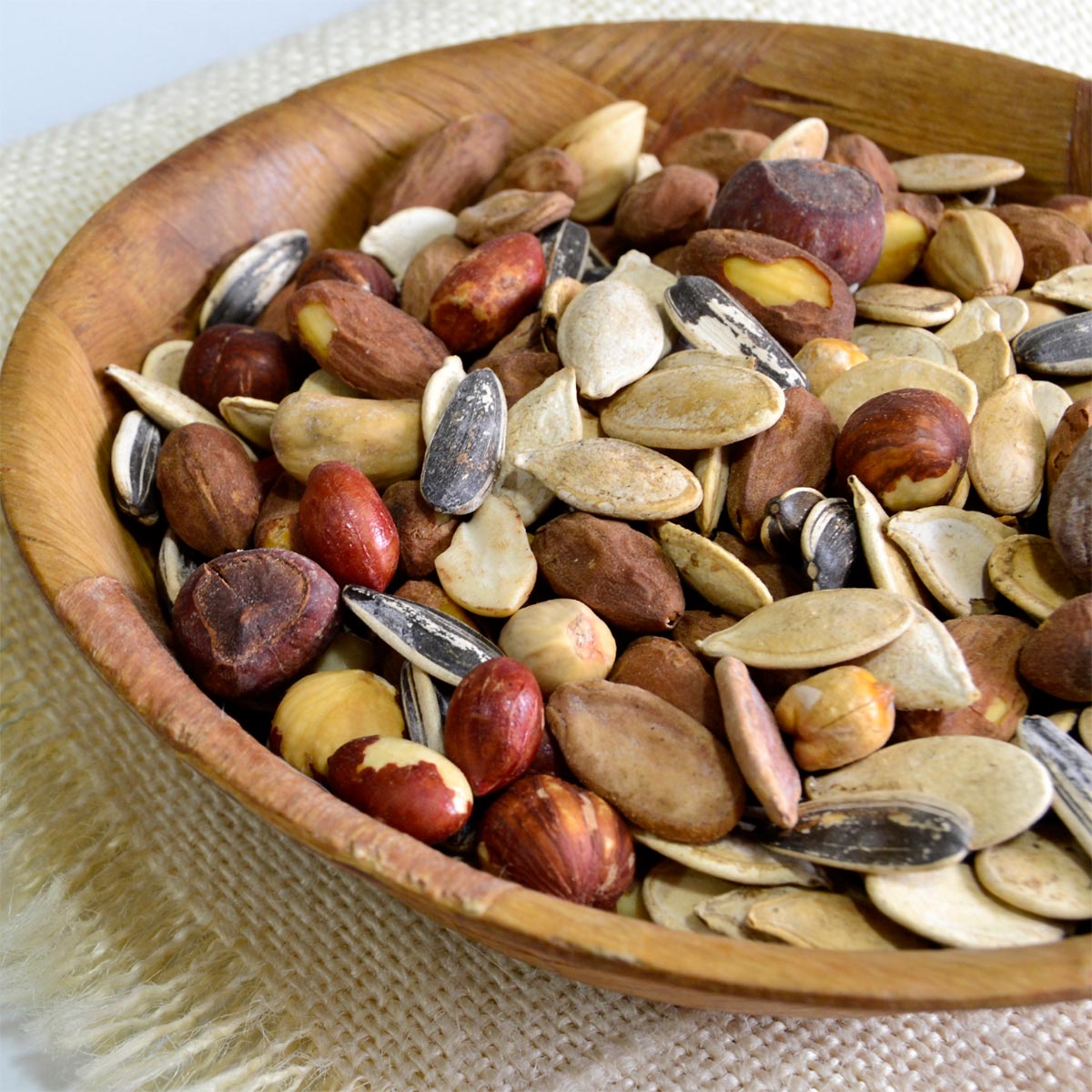When it comes to healthy eating, it's hard to beat the nutritional value and efficiency of nuts and seeds. Whether you eat them as a snack or add them to recipes, these small but mighty foods add great value to any diet. Nuts and seeds have a long history of human consumption, having been part of our diet since paleolithic times. While some examples are much healthier than others, each nut and seed brings something valuable to the table.
Nuts and seeds offer protein, fibre, vitamins, minerals, and healthy fats. They include bioactive antioxidant compounds and have anti-inflammatory properties to help fight a range of diseases. A wide variety of nuts and seeds have been found to reduce the inflammation markers associated with cardiovascular disease and type 2 diabetes.
Let's analyse nuts and seeds, take a look at activated nuts, and review the nutritional benefits of these healthy and delicious foods.
What are Nuts?
While they may not be soft and squishy, nuts are actually a type of fruit. Each nut consists of a tough outer shell, which is hard enough to protect a softer inner kernel. This hidden part of the nut is usually edible, but first it needs to be removed from its shell with force or tools. This is a key defining attribute of nuts.
It's important to distinguish botanical 'nuts' from culinary 'nuts', however, with the latter also including a variety of fruits and seeds that fall naturally from their shells. In fact, common usage of the term 'nut' refers to any hard-walled and edible kernel. Only a few nuts are actually nuts, including acorns, chestnuts, and hazelnuts.
While these foods are loved by many, some of the most popular examples do not technically meet the definition. For example, peanuts belong to the legume family, and walnuts and almonds are actually drupes. A drupe is a type of fruit with an outer fleshy part surrounding a shell. This shell is often called a pit, and it has a seed inside. While peaches and plums are drupes with delicious outer flesh, walnuts and almonds are drupes with a tasty inner seed.
What are Seeds?
If you struggle with the difference between nuts and seeds, you're certainly not alone. While there are lots of technicalities, it's important to remember one important fact — all nuts are seeds, but not all seeds are nuts. A seed is the mature fertilised ovule of a plant with an embryo, endosperm, and seed coat. Many of the world's most popular 'nuts' are actually seeds, including cashews, macadamias, and pistachios.
While drupes such as walnuts and almonds contain an inner seed, they also contain an outer fleshy part and an inner pericarp to help protect the seed. Seeds are enclosed in a seed coat, which helps to nourish the plant during the early stages of life. Some seeds need their exterior husk removed before eating, and others can be consumed as is. If you're still confused, the following differences should help to clear the air:
- Nuts have a hard outer shell that contains a dry fruit and seeds. The shell does not free itself.
- Seeds are embryonic plants with a seed coat. The outer husk is sometimes removed before eating.
- Drupes are fruits with a hard interior seed. Either the outer flesh or the inner seed can be eaten.
- Legumes have pods that contain multiple fruits. When used as a dry grain, the seed is also called a pulse.
What are Activated Nuts?
Over the last few years, activated nuts have emerged as an exciting new health trend. Activated nuts are raw nuts that have been soaked and dehydrated to promote sprouting or germination. These products are popular for many reasons. Not only are they easy to produce, but they also contain more readily available nutrients and don't have enzyme inhibitors or phytic acid.
These last two facts are related, with the natural defence system of nuts limiting the nutrients available. Nuts release enzyme inhibitors and phytic acid to prevent premature germination and sprouting. While nuts offer a wide array of great nutrients, our digestive systems can't always absorb them. These compounds inhibit our own digestive enzymes, and they're toxic when consumed in high doses.
The simple process of activation creates more nutrients, including vitamins, minerals, and proteins. Activated nuts are also delicious and much easier to digest. Seeds can also be activated, as can sprouted grains and flours like buckwheat and spelt.
Nutritional Complexity in a Simple Package
Nuts offer a wide variety of beneficial nutrients in a small and easy-to-consume package. While the exact nutritional profile depends on the nut in question, all nuts share a level of nutritional complexity. Nuts contain lots of calories and plenty of essential fats. They also contain essential amino acids, vitamins E and B2, folate, fibre, magnesium, phosphorus, potassium, copper, and selenium.
Seeds are also full of beneficial compounds, storing nutrients for the seedling before it grows into a complex plant. All seeds are a great source of fibre, and most of them provide beneficial quantities of vitamins, minerals, and antioxidants. Popular seeds also contain lots of healthy proteins, plenty of magnesium, and a wide range of healthy fats. Seeds are small and easy to consume, which makes them the perfect addition to almost any diet.
5 of the World's Most Popular Healthy Nuts
The following culinary nuts are among the world's most nutritious and popular:
Almonds
Not only are almonds delicious, but they're also packed with heart-friendly fats, fibre, magnesium, and vitamin E. Almonds have among the highest calcium content of any nut, and they help to support gut health by promoting growth of Lactobacillus and Bifidobacteria. The magnesium in almonds helps with blood sugar control and blood pressure levels, and the antioxidants have been found to reduce oxidative stress biomarkers.
Brazil nuts
Originally from the Amazon, Brazil nuts provide a rich source of magnesium, copper, zinc, vitamin E, and selenium. These nuts also contain a healthy fatty acid profile and high levels of proteins and bioactive compounds. Brazil nuts enhance our natural defence mechanisms by helping to regulate blood lipids, improving the antioxidant system, and enhancing the anti-inflammatory response.
Cashews
The much-loved cashew nut is full of beneficial nutrients, including iron, zinc, copper, magnesium, plant sterols, and mono-unsaturated fats. These healthy fats help to lower the risk of heart disease and premature death. The carotenoid and polyphenol antioxidants in cashews help to reduce inflammation and protect against disease.
Hazelnuts
Hazelnuts are loved for their sweet and earthy taste, and they also offer a range of health benefits. Hazelnuts are the second-richest nut source of mono-unsaturated fats, which makes them great for heart health. These nuts also have anti-inflammatory properties and are rich in many vitamins and minerals.
Macadamias
The macadamia nut can be added to sweet and savoury dishes to add flavour and texture. These nuts are a good source of fibre, and they also have decent magnesium, calcium, and potassium content. While macadamia nuts have more calories than most other nuts, the heart-friendly monounsaturated fats in macadamias actually help to manage cholesterol and reduce heart disease.
5 of the World's Most Popular Healthy Seeds
While nuts get lots of the attention, the following seeds also provide a vast array of health benefits:
Chia seeds
Chia seeds have become extremely popular, as they contain a number of beneficial nutrients. From fibre and healthy omega-3 fats to important antioxidant polyphenols, chia seeds are a simple and effective way to boost your nutrient intake. In addition, the antioxidants in chia seeds have anti-ageing and anti-carcinogenic characteristics.
Flaxseeds
With similar benefits to chia seeds, flaxseeds make a great addition to most diets. These seeds contain lots of fibre and omega-3 fats, including the heart-friendly fat alpha-linolenic acid (ALA). Flaxseeds also contain polyphenols, which act as important antioxidants to fight free radicals in the body.
Hemp seeds
Hemp seeds are loved by vegetarians, as they're one of very few complete plant-based protein sources. These seeds contain all the essential amino acids that your body can’t make, which makes them a great way to supercharge your diet. It's not just about quantity, however, with the protein quality of hemp seeds better than most other plant sources.
Sunflower seeds
Sunflower seeds are a good source of protein, healthy fats, fibre, selenium, copper, zinc, folate, iron, and vitamin E, among other nutrients. Along with providing a great nutritional base, these seeds help to reduce inflammation and lower the risk factors associated with heart disease.
Sesame seeds
Delicious in tahini and widely used across Asia, sesame seeds enjoy a rich nutritional profile. Along with flaxseeds, sesame seeds are the best known dietary source of lignans. These polyphenols may help to protect against cancer by interfering with the growth and spread of tumour cells. Sesame seeds also have anti-inflammatory and antioxidant properties, which are beneficial in the prevention and treatment of many disorders.
Final Thoughts
If you're looking for a great source of natural nuts and seeds to supercharge your health, check out the great range of products at Healthy Being. From delicious snacks to activated nuts and recipe ingredients, we have everything you need to stay healthy and live your life to the full.


 Certified Organic
Certified Organic Vegan Friendly
Vegan Friendly  Vegetarian
Vegetarian Organic Ingredients
Organic Ingredients Dairy Free
Dairy Free Gluten Free
Gluten Free Keto Friendly
Keto Friendly
































